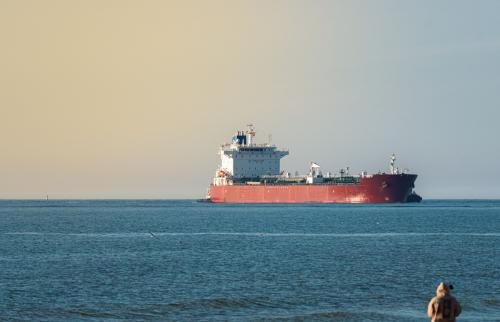Everything old is new again for Iran and Saudi Arabia. In recent days, a series of diplomatic skirmishes between Tehran and Riyadh has intensified the long simmering tensions between the two heavyweights of the Persian Gulf. The bitter clash over regional influence and energy policy parallels with striking similarity a protracted brawl between the two rivals three decades earlier, which generated a destructive spiral of violence and economic hardship for both countries.
The current Iranian-Saudi conflagration is already more dangerous than the original, as the fallout from the conflict has been felt across the region in the devastating wars in Syria and Yemen. And in contrast to the 1980s, when it was the nascent Islamic Republic whose ideological imperatives frustrated efforts at de-escalation, this time around the wild card lies in Riyadh, not in Tehran.
[T]his time around the wild card lies in Riyadh, not in Tehran.
Even by the standards of their well-established enmity, the past week has been an especially sour one between Tehran and Riyadh. The Istanbul summit of the Organization of Islamic Cooperation (OIC) ended in recriminations and resentment after the Saudis engineered a final statement that criticized Tehran. A Doha meeting of major oil producers failed to produce agreement on a Saudi proposed output freeze because of Tehran’s refusal to cooperate. And quiet talks over the annual pilgrimage to Mecca—a traditional source of strife between the two theocratic states that was further complicated by their January rupture in diplomatic relations—have just collapsed.
The handling of these three encounters among wary adversaries underscores trends already evident in Saudi foreign policy: the increasing centrality of Mohammed bin Salman, the kingdom’s deputy crown prince and defense minister, in shaping Saudi strategy, and the audacity—even incaution—with which he approaches the strategic schism between the kingdom and Iran.
Energy diplomacy gone awry
Of the three incidents, perhaps the most consequential (and illuminating) was the botched Saudi bid to stem the precipitous decline in oil prices—a drop of as much as 70 percent in the past two years, which has cost the Saudis and their Gulf neighbors at least $300 billion in revenues. The collapse reflects a variety of economic and geopolitical factors, but at its heart is a mismatch between robust oil production levels—including the kingdom’s own epic output—and flagging global demand. For months, Riyadh has been courting support from other major exporters, most notably Russia, to cap production at January 2016 levels. The proposal was predicated on adherence by all the major producing states, and reports around an initial agreement did indeed bolster prices modestly.
Not surprisingly, Tehran was never willing to join such a scheme. Having only just unfettered its economy from the international sanctions that had slashed its exports by more than 1 million barrels per day (mbpd) for several years, not even the most accommodating Iranian leadership would contemplate voluntarily forgoing the opportunity to reclaim market share and generate much-needed revenues. Public exhortations by the Saudis to join in a freeze were met with unequivocal opposition and even derision from Iranian officials.
In the face of the Iranian stance, the decision to proceed with Sunday’s meeting among major oil producers seemed to suggest Saudi flexibility on the question of Tehran’s inclusion, as did signals from the kingdom’s venerable oil minister, Ali Al-Naimi, in the days before the meeting. Expectations were relatively low, but market analysts and diplomats from other states invited to the meeting anticipated some modest yield—perhaps “bullish statements about the market adjusting and their output not increasing.” After all, commented one analyst, “if the Saudis were having cold feet, this meeting would already be canceled.”
Here is where things get interesting. In the days before the Doha meeting, Deputy Crown Prince Mohammed bin Salman, or MbS as he is frequently dubbed, doubled down on the issue of Iran. He insisted that without Tehran’s cooperation, the production freeze proposal was off the table and “we will sell at any opportunity we get.” He dismissed any concerns about the kingdom’s energy development or its fiscal viability, commenting that “this battle is not my battle. It’s the battle of others who are suffering from low oil prices.” As for Riyadh, MbS sniffed, “we have our own programs that don’t need high oil prices.”
[T]he usually well-scripted Saudi energy diplomacy took a curiously chaotic turn.
From there, the usually well-scripted Saudi energy diplomacy took a curiously chaotic turn. Having confirmed they would send a delegation to the talks, the Iranians opted to boycott entirely—no doubt with a nod to their own domestic context, where a movement was already afoot within the Iranian parliament to impeach the oil minister had he attended the meeting. The Doha meeting dragged on for hours beyond schedule as representatives sought in vain to devise some semblance of an agreement that would avoid a negative reaction from oil markets.
Blowback
The disaster in Doha came on the heels of the OIC summit in Istanbul, where a heavy-handed official communique lambasting Iranian policies only deepened the animus. It was an especially indecorous jab considering the presence of Iranian president, Hassan Rouhani, and the Turkish efforts to use the meeting as an opportunity to mediate the conflict and engineer some dialogue between Rouhani and the Saudi king, Salman, who also attended the summit.
The series of diplomatic skirmishes with Tehran only highlights the primacy of Mohammed bin Salman, who in addition to directing the kingdom’s military campaign against Iranian-backed separatists in Yemen made waves earlier this year when he discussed selling off components of the storied Saudi state oil company Aramco. One oil analyst has dubbed him “the ultimate disrupter” for having publicly outflanked Naimi, who for three decades has been the authoritative voice of Saudi oil policy.
For MbS, the oil output talks offered a convenient opportunity to deliver another blow to Tehran. And he had little to lose by using Iran as a wedge to scuttle the proposed freeze. The plan was always understood as a modest gesture; since it would have left both Riyadh and Moscow producing near peak capacity, at best a freeze might have had a slight modulating effect on the psychology of the market. Instead, Saudi Arabia and other oil producers will have to watch as the slow, erratic process of market rebalancing unfolds and global demand for oil eventually rebounds to meet supply.
However, it’s unclear if these tactics can generate newfound diplomatic leverage for the kingdom. In the aftermath of the Doha meeting, the Russian energy minister pointedly exonerated Tehran while describing the Saudi stance as “unreasonable.” Reports from the sidelines suggest that even Riyadh’s Gulf allies were “annoyed” by the sudden shift in what had been pitched to participating governments and by the fact that oil prices fell again in the days that followed.
History lesson
Still, the 31-year-old deputy crown prince might do well to study the last major oil conflict between Tehran and Riyadh, which coincidentally unfolded just around the time of his birth. Then, as now, the Saudis struggled to deal with the ripple effects of a production surge that they helped initiate; then, as now, their decision to flood the market shattered their adversaries’ balance sheets, but it also generated long-term blowback for the kingdom’s internal stability and external influence.
Much like the recent developments, the oil crisis in the mid-1980s had its roots in Saudi strategic interests toward the region as well as toward oil markets. As OPEC’s swing producer, Riyadh had absorbed massive production cuts in the early 1980s in order to maintain prices in a period of falling demand and expanding non-OPEC supply. Saudi exports sank to 2.15mbpd in 1985, approximately half of its formal OPEC quota and a mere 25 percent of its 1980 exports, even as its OPEC partners routinely disregarded their quotas. After a futile effort to persuade non-OPEC producers to cut back, the Saudis began ramping up production, and over a nine-month period beginning in August 1985, OPEC production ballooned by 4mpbd, with the kingdom responsible for approximately half that increase.
Then, as now, the Saudis struggled to deal with the ripple effects of a production surge that they helped initiate.
The decision coincided with the spillover of the Iran-Iraq war into the Gulf, via Iraqi attacks on Iran’s oil infrastructure and Iranian counter-attacks on Gulf oil exports and other shipments transiting the strategic waterway.
The combination was catastrophic for Iran, whose oil revenues plummeted from $21.2 billion in 1983 to $13.7 billion in 1984 and $6.3 billion in 1986. Meanwhile, Iran’s economy began to grind to a halt—the GDP crashed, and key sectors such as manufacturing and construction were disproportionately hit. Iranian officials saw Saudi production increases as a deliberate effort, with Washington’s active collusion, to cripple Iran’s economy and its military capability. Then-President Ali Khamenei, who is now Iran’s supreme leader, warned Riyadh that “the price war is no less important to us than the military war at the front.” Tehran tried to push back within OPEC but made little headway.
As is the case today, the Saudi strategy in the mid-1980s was neither irrational nor purely punitive toward Tehran. In fact, Riyadh’s 1985 production increases reflected an attempt to address two profound concerns: the kingdom’s massive fiscal requirements for domestic development and its international initiatives. In addition, the Saudis feared a long-term erosion in market share, weakened geostrategic preeminence, and mounting Iranian regional ambitions. They even sent quiet overtures to Tehran about the possibility of a ceasefire and sought to break the Iranian alliance with Syria.
In the 1980s, the oil strategy proved a partial success, and an incredibly costly one, for Riyadh. While the kingdom managed to claw back market share, the crisis did not generate sustained OPEC unity, nor did it produce near-term progress on subduing Tehran. The price crash hurt Riyadh’s diplomatic sway regionally and internationally, generated terrible blowback for the Saudi leadership, and caused its oil income to plummet to a mere $18 billion in 1986—a $100 billion drop from five years earlier. As one Saudi government oil economist remarked: “Everyone suffered, Saudi Arabia most of all. It was a very bad time.”
Eventually, the 1985-86 oil war subsided, as both Tehran and Riyadh came to appreciate that their interests were better served by mutual compromise. The Saudis sought an exit strategy to stem the price erosion as well as the ongoing damage to their relations with smaller producers, including the United States. Facing an inflection point in its war with Iraq, Tehran also yielded, even conceding a temporary boost for Baghdad’s production. Hubris on both sides was eventually run aground by economic realities. Mohammed bin Salman may soon learn a similar lesson.
The Brookings Institution is committed to quality, independence, and impact.
We are supported by a diverse array of funders. In line with our values and policies, each Brookings publication represents the sole views of its author(s).




Commentary
Past is prologue? Saudi Arabia’s clumsy oil diplomacy
April 21, 2016